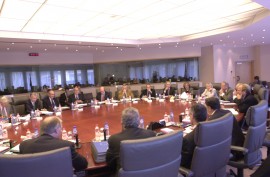
Federalist Letter to the European Constitutional Convention
Issue number 6, 3 June 2003
THE COMMON EUROPEAN INTEREST MUST BE DEFENDED!
THE INTRODUCTION OF ROTATION TO THE MEMBERS OF THE EUROPEAN COMMISSION WILL WEAKEN IT AND SHOULD BE RESISTED
Dear Members of the Convention
One of the main criticisms of the European Union in recent years has been that it is too distant from the citizen. Its decisions are not always clear, its decision-makers are not always accountable. Addressing this complaint should have been one of the main tasks of the convention. But as things stand, the present set of proposals risk, if anything, making the situation worse.
The European Commission, the independent guardian of the treaties and custodian of the common European interest, is the chief target
A prominent battleground has been the debate over the number of members of the Commission. It was agreed at the Nice summit that there should be no more than one per member state – there is a campaign now to have fewer. Why is this?
The fact that the number of member states will rise from 15 to 25 is surely no reason – a full-strength British cabinet meeting has 25 participants, and I have yet to hear a current member of that Cabinet – Peter Hain, say – describe its meetings as unwieldy and ineffective. So it cannot be because of the sheer number.
What about the number of portfolios? We are told that there are not enough proper jobs to do. Well, many national governments have ministers without portfolio, to ensure that the right people have a seat at the table. Simply being in the Commission and ensuring that a national point of view is heard is an important enough job in itself.
So, if member states – and particularly the small member states – are so attached to their seats on the Commission, how are they to be persuaded to give them up? Not by choosing the best people for the jobs, but by rotation. In the case of the Council, it is widely agreed that rotation does not work well and should be changed. It would certainly be obtuse to introduce it in the case of the Commission.
The composition of the European Commission needs particular care because while the Council chairs are countries, the Commissioners are people.
For what will happen to a member of the European Commission who has been lured from national politics to do a stint in Brussels at the end of his or her term in office? Why, he or she will be rotated out of the Commission on the grounds of nationality to make way for someone else from another country. No matter how popular, how competent, how successful, that Commissioner is out. If the aim of the EU is to eliminate discrimination on the grounds of nationality, the European Commission is surely the wrong place to do the opposite.
And the non-voting, junior members of the Commission – the member states who do not have full Commissioners will have the lite alternative – who will they be? One of the strengths of the European Commission in recent years is that it has attracted serious political figures who carry real weight in their respective member states – former Cabinet ministers and the like. Which of them is going to take a job as a junior minister in Brussels? The non-voting posts in the Brussels Commission will be completely unattractive to anyone with hopes of a political career back home. People already in the Brussels system might be willing to take the job, but nobody else.
So, because the Commissioners are human beings with careers to think of, the Commission itself will be both weakened and made more distant from political life in the member states by the introduction of a policy of rotation.
There is perhaps a case for streamlining the Commission and getting away from the one member state one seat principle, but this rotation model is worse.
And what of the legitimacy of the Commission? How will its connection with the voters be enhanced?
The leaders of the Convention have proposed that the member state governments should nominate somebody and the European Parliament will have the right to accept or reject that nomination. This will increase the democratic legitimacy of the Commission, they say. There is one tiny flaw with this so-called “new” proposal, which is that this is what happens right now. This system was brought in by the Amsterdam treaty.
It is the contention of federalists that this is not democratic enough. It would be better for the European Parliament to make the first choice based on the outcome of the European elections – each party group can put up a candidate – and the member states can make the final ratification. That way, the way that votes cast in the European elections will suddenly matter.
At the time of the last European elections, Romano Prodi had already been nominated as Commission president six weeks before the elections took place. What kind of an election is it where the results are announced beforehand? No wonder not many people voted.
What the European Union needs is the cut and thrust of party politics. All of the current member states and the new applicants are familiar with it, so we know how it works. Let the choice of political leadership for the European Union be based on the results of the elections to the European Parliament. There is a common European interest in accountable government. The age of parliamentary democracy is not yet over.
This “Federalist Letter” is issued by the Union of European Federalists as part of the “Campaign for a European Federal Constitution”. For further information and support:
UEF – Chaussée de Wavre 214 d B-1050 Brussels, Tel: + 32-2-508.30.30 – Fax : +32-2-626.95.01, E-mail: [email protected] – Website: www.federaleurope.org With the financial support, but not representing the opinions, of the European Commission.
